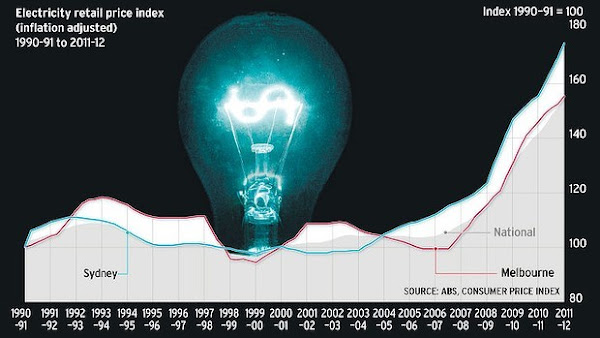
|
| U.S. Residential Electricity Price |
The United States has identified the reasons behind rising electricity costs and has overcome them.
There are two reasons for high electricity prices in Australia:
- Peak demand has been growing very quickly. Australia's national electricity market rules encourage massive investment in grid infrastructure that is only used for a few hundred hours per year.
- Air conditioners are being installed at an increasing rate. Australia has opted for air-conditioners that increase peak demand for electricity.
The United States has overcome both of these causes of Australia's high electricity prices:
- Peak demand is addressed by rewarding electricity consumers who are able to reduce their demand for electricity in peak periods. With NO massive investment in grid infrastructure to be used for just a few hundred hours per year, there is no need to double electricity prices to pay for it.
- The United States is installing air conditioning systems that shift the cooling load of buildings to off-peak periods.
 |
| Australian residential electricity prices |
Further reading - Demand Response
1. Comprehensive Demand Response with DemandSMART2. DemandSMART Australia: Beat the Peak – and Get Paid
Further reading - Off-peak air conditioners
1. TransGrid - Cool savings achieved with innovative air conditioning system2. How Off-peak Cooling Systems Work
3. Off-peak Cooling Basics
4. Off-peak Cooling Systems For Light Commercial and Residential Use
5. The Future of Off-peak Cooling
| Air conditioners are energy hogs, so if you want to save money, go off peak. |

2 comments:
When we lived in Massachusets/US, the price per kWh was between 16 cents and 22 cents.
12 cents is the cheapest tariff you can find in the US.
But it's true that they decoupled the earnings for retailers from the amount of kWh they sell.
The Australian Industry Group, Brotherhood of St Lawrence, Choice and the Energy Efficiency Council have jointly commissioned a study on power prices.
A quarter of electricity costs are driven by "super peaks" - typically a few very hot or cold days when power consumption surges during peak periods.
The cost of extra infrastructure, both generation and transmission capacity, to deal with these peaks has pushed up power bills.
A key proposal is to reward consumers able to cut demand in these peak periods; To enable consumers (both businesses or households) to sell "demand response" to the wholesale market during times of super peak demand.
Read more Business, charities unite for energy price campaign
Post a Comment